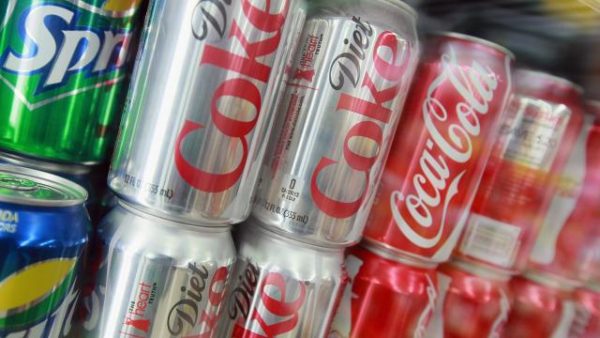

OLYMPIA — If producers of America’s favorite soft drinks have their way this fall, Seattle will be the only community with a soda tax in Washington in the future.
They are pushing a statewide initiative to bar cities and counties from imposing their own taxes on sweetened beverages as well as other food and drinks typically sold in supermarkets.
This week, the political committee Yes! to Affordable Groceries submitted language for the measure it hopes to get on the November ballot. If all goes well, signature-gathering should begin next month.
Its financial muscle comes from the American Beverage Association, with key donors so far being The Coca-Cola Co., PepsiCo Inc., Dr Pepper Snapple Group Inc. and Red Bull North America Inc.
Its message is getting spread by a political coalition made up of the Joint Council of Teamsters No. 28, which represents beverage industry workers, as well as the Washington Food Industry Association and the Korean-American Grocer’s Association of Washington.
The initiative’s purpose is to prevent local governments from instituting their own taxes on food. Such taxes pose a greater financial burden on low-income and working class families than wealthier ones, said Pete Lamb, senior business agent for Teamsters Local 174.
Another reason, he said, is that as costs of the taxed products go up, demand for them will go down. Over time this would result in a loss of jobs for those who make, deliver and stock the products.
“We think people are fed up with regressive taxation. We think citizens of Washington have clearly seen what’s taken place in Seattle and are not OK with this type of tax,” he said. “This initiative gives the citizens of the state of Washington and our workers the ability and the right to vote on this because they are the ones shouldering the burden predominantly.”
The proposed initiative says “a local governmental entity may not impose or collect any tax, fee, or other assessment on groceries.” Among items covered are meat, poultry, fish, fruits, vegetables, grains, bread, milk, cheese and other dairy products, non-alcoholic beverages, condiments, spices, cereals, seasonings, leavening agents, eggs, cocoa, teas, and coffees whether raw or processed.
It does not prevent the state from imposing a tax on groceries. Alcoholic beverages, tobacco and marijuana products, which are currently regulated and taxed by the state, are excluded.
And, Lamb said, it doesn’t impact the sweetened beverage tax Seattle approved last year and began collecting Jan. 1. However, he noted, a provision in the proposed initiative would prevent Seattle from increasing or expanding that tax.
To qualify for the ballot, supporters would need to turn in signatures of at least 259,622 registered voters by July 6. The Secretary of State’s Office recommends submitting at least 325,000 signatures to allow for any duplicate and invalid signatures.
With this initiative, the American Beverage Association is taking the offensive on an issue on which it has mostly played defense in recent years.
The first soda tax was approved in Berkeley, California, in 2014. Since then, Philadelphia enacted one. In November 2016, voters approved soda taxes in Boulder, Colorado, and three cities in California — San Francisco, Oakland and Albany — in spite of spirited opposition from the beverage industry.
In Seattle, the City Council approved the tax rather than put it on the ballot. Many of the forces behind the initiative opposed the city measure.
One of the beverage association’s few victories came last fall when Michigan lawmakers approved a statewide ban on local taxes on sweetened-beverage drinks and food.
Lamb said the union wants to go “on the offensive to protect our members and to protect working families. We believe very strongly that (a tax on soda and food) is very unpopular.”
If it makes the ballot, the initiative won’t be popular with leaders of local governments who resist attempts to pre-empt their power to legislate, regulate and tax. And the principle holds even for something like a soda tax, which it doesn’t appear any community is aggressively pursuing right now.
“There might be a city looking to do this but I know of no other jurisdiction that is proposing such a measure,” said Everett City Councilman Paul Roberts, past president of the Association of Washington Cities. “(The initiative) appears to be an overreach based on what I’ve heard.”
Jerry Cornfield: 360-352-8623; jcornfield@herald net.com.
Twitter: @dospueblos.
more recommended stories
 Frito-Lay® Introduces Cracker Jill™ to Support and Celebrate Women in Sports
Frito-Lay® Introduces Cracker Jill™ to Support and Celebrate Women in SportsApril 5, 2022 Cracker Jack®.
 Federal Power Utility Threatens To Shut Off The Lights On Marijuana Businesses After Mississippi Legalizes Medical Cannabis
Federal Power Utility Threatens To Shut Off The Lights On Marijuana Businesses After Mississippi Legalizes Medical CannabisBy Kyle Jaeger February 8, 2022.
 LEGO Goes To Hemp Plastic By 2030
LEGO Goes To Hemp Plastic By 2030AXEL BARRETTAugust 16, 2019 LEGO aim.
 “70% Of The Colorado Industry Pushed Weed On Pregnant Moms”
“70% Of The Colorado Industry Pushed Weed On Pregnant Moms”Smart Approaches to Marijuana (SAM) .
 What You Need to Know About Marijuana Use and Pregnancy – Centers for Disease Control and Prevention
What You Need to Know About Marijuana Use and Pregnancy – Centers for Disease Control and PreventionJust a personal note here,.
 Here Are The Full Details Of The New Federal Marijuana Legalization Bill From Chuck Schumer And Senate Colleague
Here Are The Full Details Of The New Federal Marijuana Legalization Bill From Chuck Schumer And Senate ColleaguePublished July 14, 2021 By Kyle.
